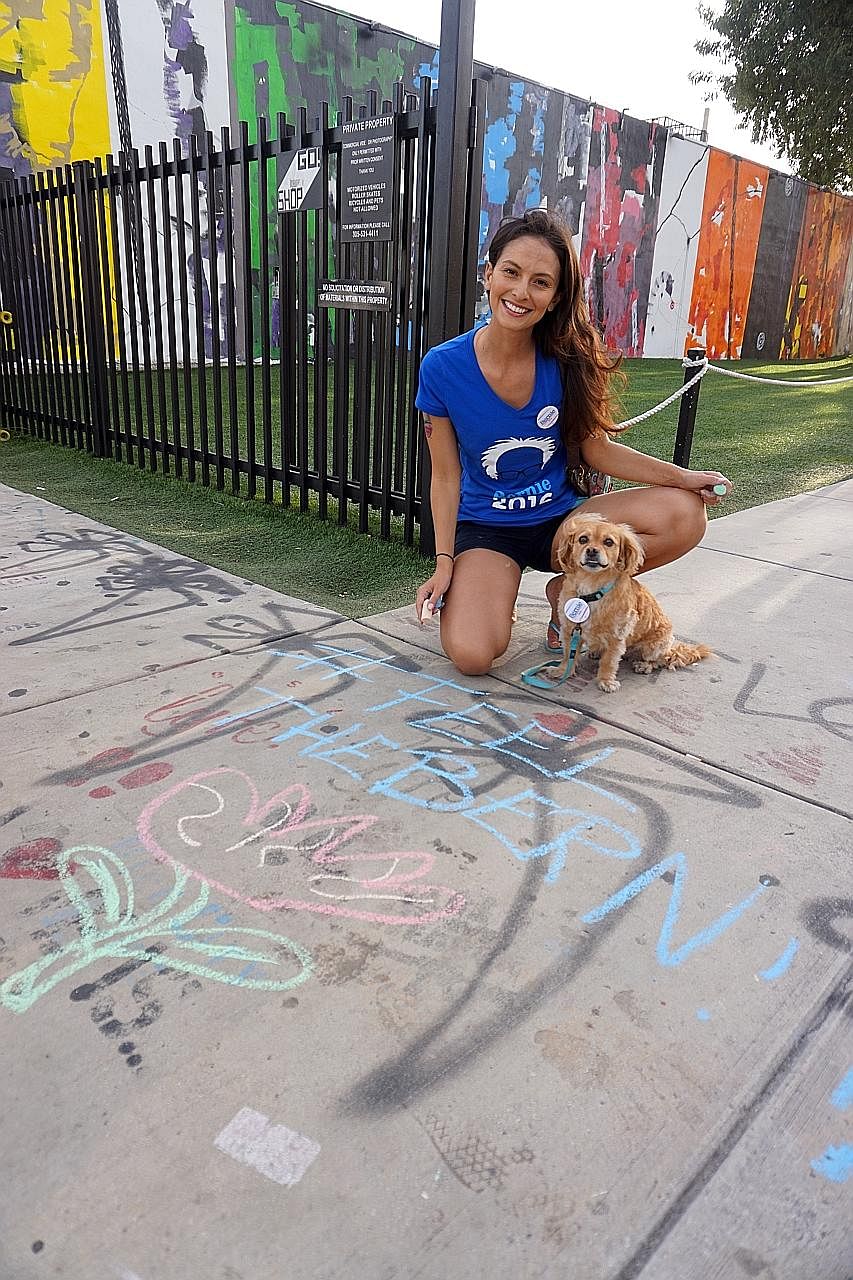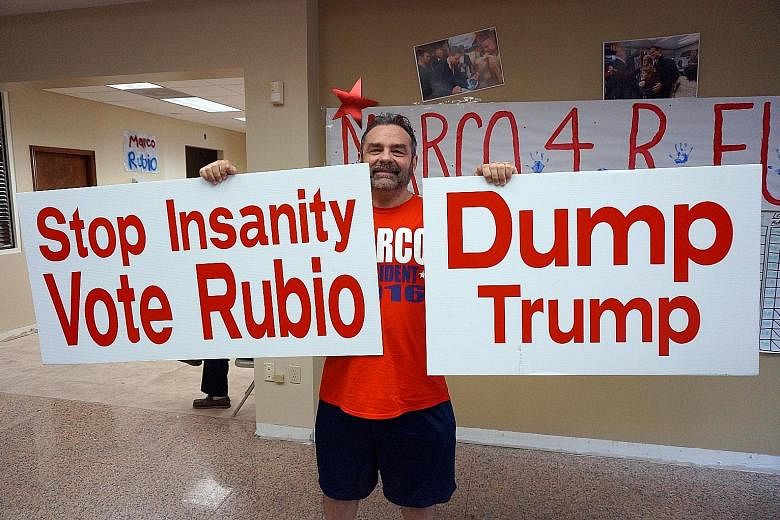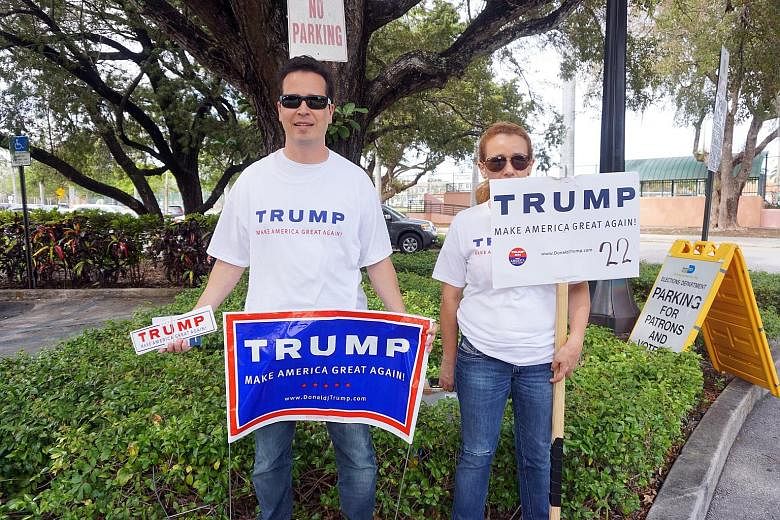A dozen or so Donald Trump signs are loosely arranged under a shady tree outside Miami City Hall. Perched amid that makeshift political nest is Ms Mayra Puchades.
The 58-year-old florist has spent about 20 hours over the past two days making a last-minute pitch to voters as they head to cast their votes. Though polling day in the Florida primary is on Tuesday, a few centres have opened early.
"Mr Trump is a businessman and when he talks about making deals and when he speaks about negotiating, that's what we need, because even in your life with your partner you need to negotiate, and we need a great negotiator," Ms Puchades said when asked about her support for the controversial tycoon.
Though the Republican front runner has taken flak from all sides after a planned rally in Chicago last Friday was marred by violence, his supporters in Florida are not wavering.
Ms Puchades said, in fact, she is used to animosity from others: "Some people have removed the Trump signs in my garden and thrown them in the garbage. We are free, we are a democracy, you support who you want to support."
Similarly, researcher Javier Baez, 44, said the clashes in Chicago made him more determined to canvass support for Mr Trump.
"What happened yesterday made me stay here stronger," said Mr Baez, who has been standing in front of the Coral Gables Library polling centre for four hours every day for the past two weeks. "We have the right to hear a person's views. I felt sad yesterday."

-
Why March 15 primaries so important
-
HOW MANY STATES ARE VOTING?
Five states hold primary races for the Democratic and Republican parties. They are Florida, Illinois, Missouri, North Carolina and Ohio. The Northern Mariana Islands also picks a Republican nominee.
HOW MANY DELEGATES ARE UP FOR GRABS?
In total, 784 delegates are up for grabs on the Democratic side, while Republicans are battling it out for 367. That amounts to over 20 per cent of available delegates. Democratic Party delegates will be allocated proportionally. Republican states can now start allocating all delegates to the winner and that will be the case in Florida (99 delegates) and Ohio (66).
WHY ARE THE MARCH 15 PRIMARIES SO IMPORTANT?
Though five states are voting, most of the attention will be focused on Florida and Ohio. They are important, not just for the number of delegates up for grabs but also for the fact that they are swing states that could determine the outcome of the general election. Both are winner-takes-all states, which means the victor can start to either pull away from the pack or close in on the leaders.
The enthusiasm from Trump supporters was mirrored across other campaigns in this state over the weekend as they made a final push ahead of tomorrow's vote.
More than in most recent elections, Floridians are paying attention to election news, debating politics with their friends and getting involved in campaigns.
Ms Eva Singer, 71, is another good example of the level of enthusiasm among Floridians. On Saturday, the first-time primary voter was standing on the other side of the library from Mr Baez, waving her Senator Marco Rubio sign at passing cars.
And she vehemently disagrees the violence in Chicago would not hurt the Trump campaign: "I love everything that happened in Chicago. It shows what he will face if he is our nominee. When I heard it this morning, I said I don't need to come out here and raise this sign, those people are going to take care of him."
The heightened interest in Florida is also borne out by early voting numbers. And all signs are pointing to a record voter turnout.
Though Texas Senator Ted Cruz has only belatedly put in some resources in the state and Ohio governor John Kasich is focusing on his home state, there is a fierce fight between Mr Trump and Mr Rubio.
In 2012, 646,000 early ballots were submitted by Republican voters. This year, that number is well over one million.
On the Democratic side, a victory by former secretary of state Hillary Clinton is being taken as a foregone conclusion, even if the shock win by Senator Bernie Sanders in Michigan last week made clear that anything can happen this year.
The Sunshine State draws together several important political threads and is thus considered just about the most important political contest in the primaries as well as the broader election.
Florida is a winner-takes-all primary; it is an important swing state in the general election; it is an important bellwether for the Hispanic community; it represents an almost do-or-die contest for its hometown senator, Mr Rubio; and it is one of the last opportunities for the #NeverTrump movement to stop him from securing the nomination.
Over the weekend, volunteers from the various campaigns fanned out across the state to rally support. Apart from the various people standing outside polling centres, volunteers knocked on doors, handed out fliers and made phone calls. At Mr Rubio's campaign office in Miami, dozens of volunteers sat in front of computers with headsets on, calling voters to remind them to vote. The automated system allows the campaign to call nearly 10,000 voters a day, with each volunteer making 150 calls per shift.
Mr Trump has not invested in the same sort of ground game infrastructure but he has his fair share of advantages in the state he calls his "second home". The businessman employs thousands across his hotel, three golf courses, three condominium projects and the private Mar-a-lago Club, which also includes his private residence.
Mrs Clinton's supporters, meanwhile, spent most of Saturday canvassing for votes in the Miami Beach area, while Mr Sanders' volunteers held a "chalk the walk" event, which involved writing campaign slogans with chalk on a sidewalk.
The candidates themselves were also busy holding rallies across the state, none more so than Mr Rubio. He has focused all his energies on his home state, even roping in help from outside the state, such as Utah congresswoman Mia Love. "This is the home of Marco Rubio, please do not abandon the person who has worked the hardest for you," she said.
Mr Rubio argued in recent days that voters hoping to stop a Trump nomination need to rally behind a single candidate in Florida. Still, recent polls showed him trailing Mr Trump by double digits in the state.
"I think what we are seeing is a lot of anger among the voters and an appetite for something different," said Dr Casey Klofstad, associate professor of political science at the University of Miami. "It may be that this is the perfect storm for someone like Trump."
• Additional reporting by Melissa Sim


